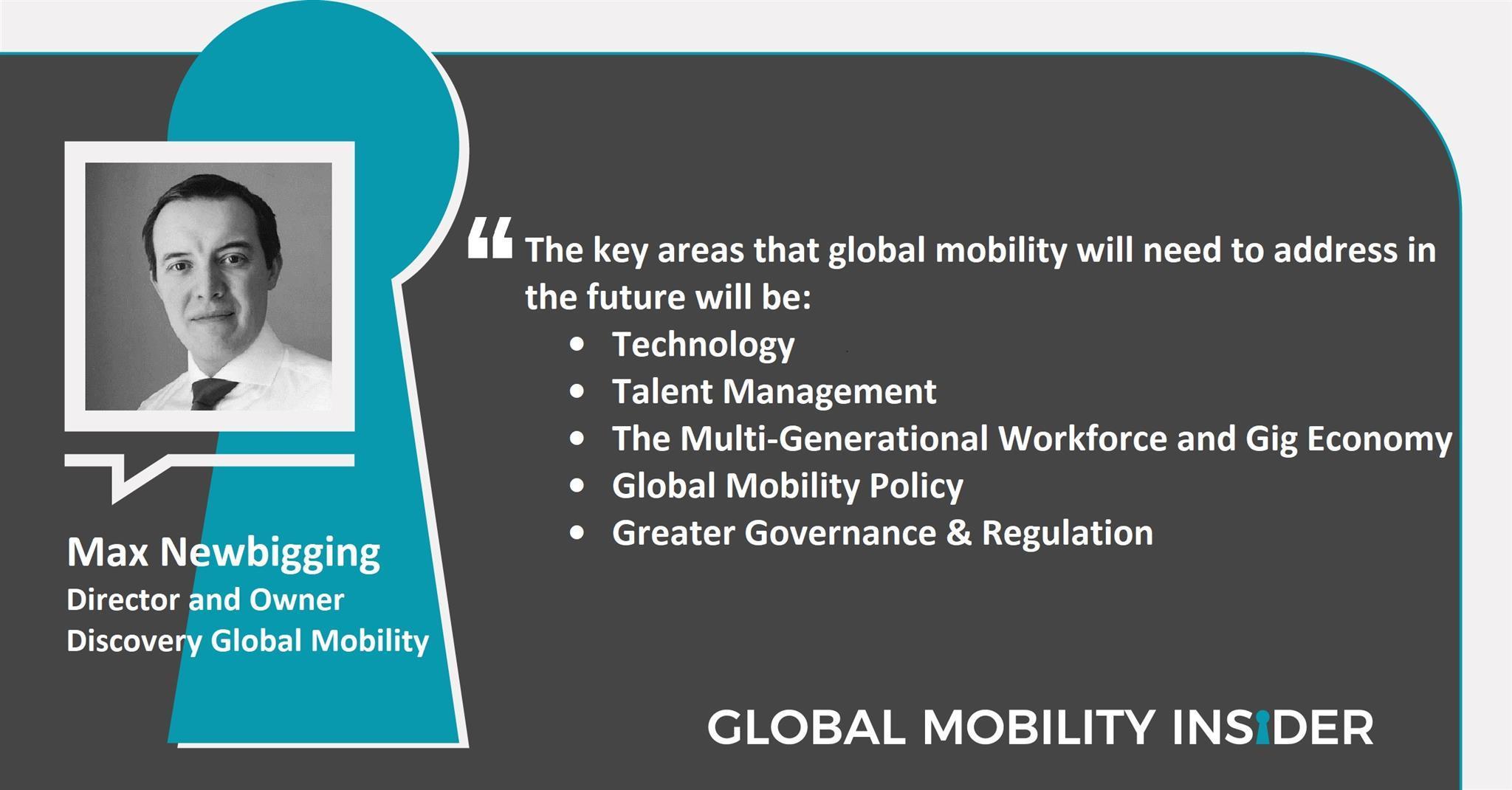Max Newbigging - Director and Owner - Discovery Global Mobility
Name: Max Newbigging
Position: Director and Owner
Company: Discovery Global Mobility

Professional Background
Discovery Global Mobility, Director and Owner (United Kingdom): 2017 – Present
Old Mutual PLC, Head of Global Mobility (United Kingdom): 2011 – 2017
Bank of America Merrill Lynch, Vice President Human Resources (United Kingdom, Hong Kong): 2009 – 2011
Merrill Lynch, Vice President (United Kingdom): 2003 – 2009
GMAC Global Relocation Services, Consultant (United Kingdom): 2002 – 2003
PwC, Consultant (United Kingdom): 2001 – 2002
British Airways, Assistant to the Director of HR (United States): 1999 – 2000
Career Insider
Q: Why global mobility, and how did you get started in the industry?
A: After graduating from University, I obtained an internship within the HR team at British Airways in New York. Part of the role required me to assist their expatriates and I really enjoyed the variety and complexity of the work and I have specialised in global mobility ever since.
Click & Like on LinkedIn
Q: What is 'business as usual' like at Discovery Global Mobility?
A: A typical day involves me working on a variety of areas from strategy, sales, marketing and operations. I have been busy raising the profile of the company and exploring new business opportunities. I have also been working hard to provide global mobility support and consulting services to my existing clients.
Q: What are you proud of achieving in your career and what's next?
A: I have found global mobility to be a very rewarding career and have taken a great deal of job satisfaction from helping expatriates move internationally. I have also enjoyed helping businesses improve their global mobility activities and how the changes I have implemented have translated into more successful business outcomes.
Following the Bank of America acquisition of Merrill Lynch in 2008, I worked on the project to merge the two separate global mobility functions together. This involved harmonising all areas including the policy, process, reward, benefits, allowances, individual assignment packages, relocation providers and the global mobility advisor teams.
Most recently, I am enjoying the challenge of running my own business.
Industry Insider
Q: How do you think the global mobility industry has changed over the years?
A: When I started in the industry 18 years ago, global mobility was viewed as an administrative function that provided logistical, tax and compliance support when relocating expatriates from A to B. Although these aspects are still a core component of global mobility today, there is a much better understanding of the complexity and breadth of global mobility. There is greater awareness around the importance of linking global mobility to talent management practices, developing cultural agility, a greater appreciation for the factors that can cause assignments to succeed or fail, and how global mobility can help businesses achieve their strategy.
In my view, there has never been a better time for global mobility professionals to play a more strategic role in their organisations and show how they can add value.
Q: What do you think is the primary thing hindering the global mobility industry's progress?
A: Global mobility is becoming more complex to manage given the current climate of greater governance and regulation. This places additional pressure on global mobility professionals to find solutions to more complex operational issues which prevents them from spending time focussing on how they can add value to their business from a strategic mobility perspective.
I also think further work is required to help the broader HR function and business stakeholders understand global mobility, what it encompasses, what are the risks if not handled correctly and the benefits it can bring if handled well. I find global mobility can be the poor relation compared to other mainstream HR disciplines and is often undervalued and misunderstood.
Q: What kind of tech or software would you suggest for global mobility processing?
A: I think technology will continue to make our life easier and reduce the time we spend on administrative tasks. This will enable us to focus on those areas that add the most value and where we can share our expertise. It’s going to be exciting to see how new innovations like artificial intelligence (AI) will impact the global mobility world. I think we will see more apps, web-based services and greater integration of systems. The current assignment management systems will continue to evolve and become more user friendly and effective at managing every aspect of global mobility.
I would like to see these assignment management systems become more accessible to smaller global mobility programmes who move lower numbers of expatriates and find the cost to implement these systems to high. Smaller global mobility programmes often have to use alternative methods to store, organise and manage their assignment data like Excel. In the current business environment with greater governance, regulation and data protection requirements, having access to a secure platform to manage your global mobility initiatives is going to become increasingly important to reduce potential risk issues.
Although technology comes with many benefits, maintaining the human element in global mobility remains vitally important to provide emotional support and guidance throughout the relocation process. I think expatriates still appreciate human interaction however that may change as technology continues to advance and new generations enter the workforce who are more comfortable dealing with AI or chatbots. Whoever can deliver a product that combines technology with the human element and can make the global mobility process easier to navigate will deliver a great solution to help businesses manage their global mobility activities.
Visionary Insider
Q: How can global mobility practices get better in the next 5 years?
A: As the world becomes more complex so will the process of relocating expatriates. Providers that help businesses with their global mobility initiatives will need to become even more customer focussed and offer agile solutions to changing business needs and requirements. There is a growing need for skills and support to help navigate some of the more complex aspects of global mobility. For example, I often hear global mobility professionals struggling to find clear guidance and advice to help them manage their expatriate pension plan arrangements, deferred compensation structures, and expatriate payroll activities. The providers that can help support these technical challenges by providing clear and straight forward advice will add value to their clients.
Q: What are the major developments you currently see happening in the industry?
A: For me the key areas that global mobility will need to address in the future will be;
- Technology
How can global mobility get the most from some of the new innovations we are starting to see today (AI)?
- Talent Management
How can global mobility continue to improve the link with talent management practices?
- The Multi-Generational Workforce and Gig Economy
How can global mobility respond to changing needs, expectations and ways of working?
- Global Mobility Policy
How is global mobility policy going to evolve to changing business and employee needs with a focus on the expatriate experience?
- Greater Governance & Regulation
How is global mobility going to help businesses navigate this complexity?
Either/or…
- Short-term or long-term assignment? Both have their merits
- Airbnb or serviced apartments? Serviced apartments
- Excel or global mobility software? Both dependant on the size of the mobility programme
- Lump-sum or flex-ben? Flex-ben
- Facebook or LinkedIn? LinkedIn
- Outlook or Gmail? Outlook
- Taxi or Uber? Taxi
- iOS or Android? iOS
- Mac or PC? PC
- Computer or tablet? Both
- Work hard or play hard? Both


Leave a Comment
* Fields marked with this asterisk are mandatory.